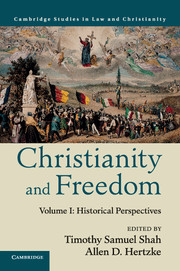Book contents
- Frontmatter
- The Religious Freedom Research Project
- Contents
- Contributing Authors
- Acknowledgments
- Introduction: Christianity and Freedom: Ancient Roots and Historical Innovations
- 1 The Roots of Religious Freedom in Early Christian Thought
- 2 The Christian Roots of Religious Freedom
- 3 Lactantius on Religious Liberty and His Influence on Constantine
- 4 Augustine and Religious Freedom
- 5 Christianity and the Roots of Human Dignity in Late Antiquity
- 6 Liberty of Conscience and Freedom of Religion in the Medieval Canonists and Theologians
- 7 Faith, Liberty, and the Defense of the Poor: Bishop Las Casas in the History of Human Rights
- 8 Calvinist Contributions to Freedom in Early Modern Europe
- 9 Constitutional Protection of the Freedom of Conscience in Colonial America: The Rhode Island and Pennsylvania Experiments
- 10 Christianity and Freedom in the American Founding
- 11 Vibrant Christian Pluralism and the Evolution and Defense of Religious Liberty in America
- 12 Orthodox Christian Contributions to Freedom: Historical Foundations, Contemporary Problematics
- 13 Christianity: A Straggler on the Road to Liberty?
- 14 Protestant Missionaries and the Centrality of Conversion Attempts for the Spread of Education, Printing, Colonial Reform, and Political Democracy
- 15 God and Freedom: Biblical Roots of the Western Idea of Liberty
- Index
13 - Christianity: A Straggler on the Road to Liberty?
Published online by Cambridge University Press: 05 May 2016
- Frontmatter
- The Religious Freedom Research Project
- Contents
- Contributing Authors
- Acknowledgments
- Introduction: Christianity and Freedom: Ancient Roots and Historical Innovations
- 1 The Roots of Religious Freedom in Early Christian Thought
- 2 The Christian Roots of Religious Freedom
- 3 Lactantius on Religious Liberty and His Influence on Constantine
- 4 Augustine and Religious Freedom
- 5 Christianity and the Roots of Human Dignity in Late Antiquity
- 6 Liberty of Conscience and Freedom of Religion in the Medieval Canonists and Theologians
- 7 Faith, Liberty, and the Defense of the Poor: Bishop Las Casas in the History of Human Rights
- 8 Calvinist Contributions to Freedom in Early Modern Europe
- 9 Constitutional Protection of the Freedom of Conscience in Colonial America: The Rhode Island and Pennsylvania Experiments
- 10 Christianity and Freedom in the American Founding
- 11 Vibrant Christian Pluralism and the Evolution and Defense of Religious Liberty in America
- 12 Orthodox Christian Contributions to Freedom: Historical Foundations, Contemporary Problematics
- 13 Christianity: A Straggler on the Road to Liberty?
- 14 Protestant Missionaries and the Centrality of Conversion Attempts for the Spread of Education, Printing, Colonial Reform, and Political Democracy
- 15 God and Freedom: Biblical Roots of the Western Idea of Liberty
- Index
Summary
EXECUTIVE SUMMARY
This chapter takes issue with the secular liberal narrative, which claims that liberal democracy could only emerge when politics was cast free from Christianity. Looking at the critical period of 1800–2000, when modern liberal democratic institutions saw their most rapid development, I argue that the secular liberal narrative merits sharp revision. In manifold manners and instances, Christians advanced political liberty during this period.
I make three claims in particular. First, throughout this period Christian thinkers and leaders advocated an expansion of liberty, whether that meant a widening of the franchise, the freeing of slaves, the toppling of dictatorships, or the legal guarantee of religious freedom. I demonstrate this with respect to eight Western countries in the period 1800–1970 and then on a global scale from 1970 to the present. I argue that Christian advocates of liberal democracy were ahead of their own regime and sometimes of their secular counterparts. Though I make no effort to compare the numbers and power of Christian advocates of liberal democracy with those of Christians who opposed liberal democracy, I argue that the advocates were numerous, often prominent, and of enduring historical significance.
Second, Christian advocates of liberal democracy during this period made their case on distinctive Christian grounds – reasons that they drew from the classic Christian tradition (and, in the Catholic case, were consistent with the enduring dogmatic teachings of the Catholic Church). That is, they did not simply come around to accepting theories of liberal democracy that others had developed without reference to God. Most of the figures that I examine in this essay were keen to differentiate their case for liberal democracy from that of the Enlightenment. They were Christian liberals, not liberal Christians.
Third, Christian liberals usually made their case in an atmosphere in which their own religious liberty was curtailed or assaulted. This varied, to be sure, with respect to the regime and the Christian church involved. Still, the curtailment was common and carries two implications. First, it helps to explain the stance of Christians who did not embrace liberalism. While many Christians’ rejection of liberalism arose from a yearning for the ancien régime, in other cases the refusal was a reaction to liberalism's own illiberalism, that is, an ironic hostility to religious freedom of otherwise liberal regimes.
- Type
- Chapter
- Information
- Christianity and Freedom , pp. 333 - 366Publisher: Cambridge University PressPrint publication year: 2016

